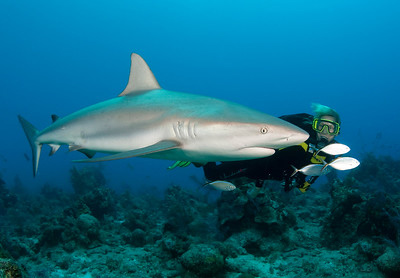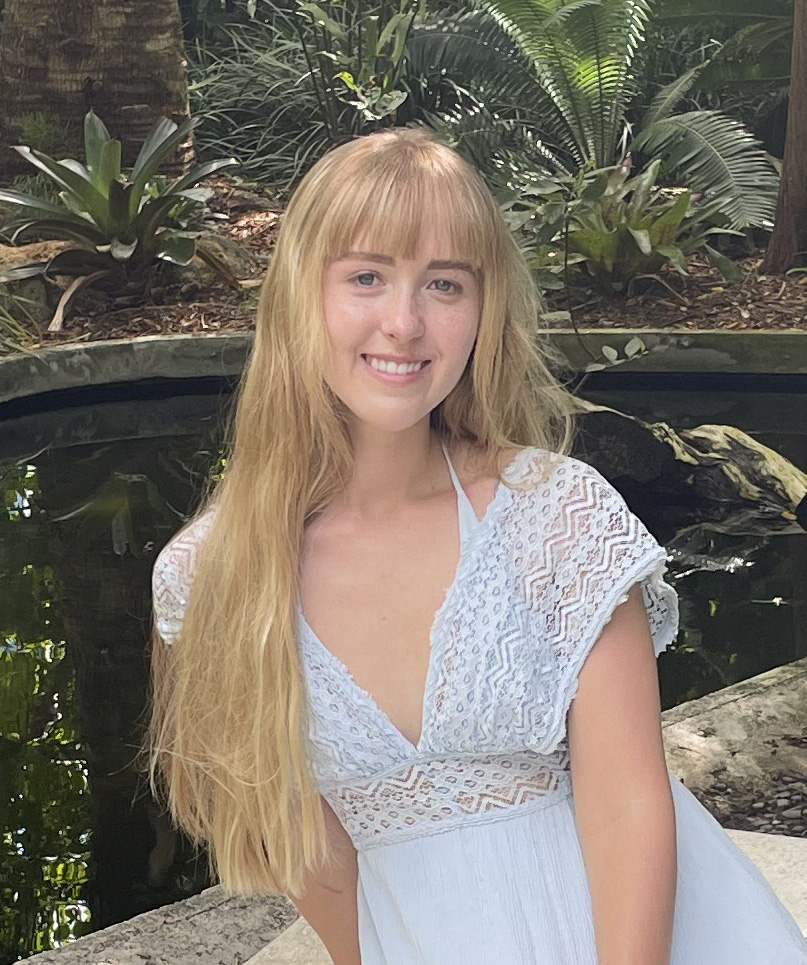By Megan Hoover, Sea of Change Foundation Intern
Samantha Whitcraft, Sea of Change Foundation, Executive Director
It’s that time of year again when Shark Week commercials promoting documentaries and shows on Discovery Channel and National Geographic begin. This year is the 34th anniversary of Shark Week, and both Discovery Channel and National Geographic have an intense week of programming planned for shark lovers and adrenaline junkies alike. But how might such programming impact the public’s view of sharks?

While enjoying Shark Week, there a few concepts to keep in mind. Historically, sharks were viewed as aggressive “monsters” and still often have negative descriptors associated with them like “feeding frenzy”, “man-eater”, and most frequently, “shark-infested waters”. All these descriptors are the product of media, not science. For example, some sharks may be monstrous in size, but none are monstrous by definition. Sharks don’t feed in a “frenzy”; in fact, due to millions of years of evolution they know exactly what they are doing when they hunt and feed. And they don’t “infest” waters because those waters are their natural habitat. In fact, many shark species and populations are in decline around the world. Based on global data and assessments, the IUCN Red List of Threatened Species (from the science-based International Union for the Conservation of Nature), estimates that approximately 42% of all shark species fall under one of their threatened categories while an additional 14% of sharks species are categorized as data deficient, meaning there is not enough information to know what their population status is, currently. In total, scientists estimate that 56% of shark species are either threatened with extinction or are unaccounted for, which is more than half of all known shark species.
One of the of the greatest threats to sharks is overfishing due to the shark fin trade. Mote Marine Laboratory scientists sampled 9,820 fin trimmings from markets in China, which is one of the largest shark fin trade hubs in the world and found that the fins belonged to 86 different species of sharks and their relatives (rays and chimeras) with 61 of those shark species being currently threatened with extinction. Alarmingly, there are few regulations to protect them within their range, and it is possible a wave of extinctions is on the horizons with coastal sharks. Why does it matter that so many shark populations are in decline? There are important reasons why we should care: many shark species play a significant role in ecological functions; they are economically valuable in ecotourism; and solving the mysteries of their complex physiology may help improve the human condition both in health and engineering.
Scientific studies demonstrated that predators, such as many shark species, help maintain healthy ecosystems. For example, a 2014 study entitled Ecological importance of sharks and rays in a structural foodweb analysis in southern Brazilconfirmed that the loss of many large sharks causes changes in the intermediate levels of a food web, but these researchers also found that this dynamic is different in some tropical regions such as in Brazil where the study was conducted. Tropical regions are known for their high biodiversity which creates structurally complex food webs and high topological redundancy, suggesting that these linked food webs could be readily impacted when one or more components are lost. This study found that some species of sharks act as key elements with high structural importance within the ecosystem, serving as important links between other compartments of the foodweb. Based on this study, removing even one shark species from the ecosystem could negatively influence the flow of the food web.
Not only are sharks important for ecosystem services, they also bring economic value to ecotourism. Shark-based ecotourism includes SCUBA diving, sustainable catch-and-release sport fishing, and snorkeling. A 2020 study entitled “Shark ecotourism in Mexico: Scientific research, conservation, and contribution to a Blue Economy” calculated the economic benefits of shark-watching in Mexico. The estimated annual gross revenue specifically attributable to shark-watching at popular sites in Mexico was estimated to be at least $12.4 million per year excluding additional tourism-based economic activities associated with shark-watching such as additional travel and accommodations beyond these sites. Additionally, a survey of nature tourism operators across the Gulf of California and the Baja California Peninsula identified sharks, especially encounters with whale sharks, as the third most important attraction for their businesses, along with the beauty of reef fishes and the magnificence of cetaceans.
Sharks also help humans directly. One example is the correlation between shark research and cancer research. An article posted on University of Wisconsin-Madison’s School of Medicine and Public Health’s webpage, details how sharks will be integral to research focused on therapies for diseases such as cancer. Dr. Aaron LeBeau will be leading the shark-based cancer research, which is currently the only research of its kind in the world as of January of 2022. He and his colleagues are actively investigating the function of small proteins found in sharks called Variable New Antigen Receptors (VNARs) that may be used to treat certain cancers such as breast, colon, pancreatic, and prostate cancers. One important characteristic of VNARs, which are part of sharks’ adaptive immune system (i.e., the “memory” immunity using antibodies) is that they can be engineered to recognize viruses, bacteria, or cancer cells.
Not only are sharks beneficial to medical research, the US Navy has also taken an interest in their skin structure. In 2005, sharks provided inspiration for improved naval ship coatings. University of Florida engineers developed an environmentally friendly coating for hulls of oceangoing ships based on shark skin structure. This new coating was designed to mimic the unique skin of sharks, and thereby, allows ships’ hulls to limit the growth of aggressive marine algae and barnacles. This environmentally friendly option has the potential to decrease the use of conventional, toxic copper hull paints that can accumulate in harbor waters. Such an innovation could help save on Naval operational costs. The Navy estimated that approximately $600 million was spent annually just powering navy ships and submarines, with at least $50 million being spent due to the increased drag on the ships from accumulated barnacles and algae. Engineered, simulated shark skin could be the answer.
Given all that sharks do for us, during Shark Week 2022 and beyond, let’s think about sharks as animals to appreciate for more than just their awesome size and power. They deserve to be celebrated for their services to human society and thanked for what they do for the health of our oceans and our coastal economies. When we think about sharks, we should fear their potential extinctions, not their existence.
Discovery Channel’s Shark Week programming starts July 24 and runs through July 30 from 8 to 11 PM EST every evening. National Geographic is streaming SHARKFEST throughout July.
LEARN MORE:
International Union for the Conservation of Nature’s (IUCN) Red List of Threatened Species
UW–Madison expert launches novel cancer research using sharks (wisc.edu), 2022
Sharks Provide Inspiration for Ship Coatings. Extracts. University of Florida





